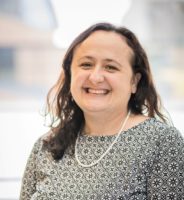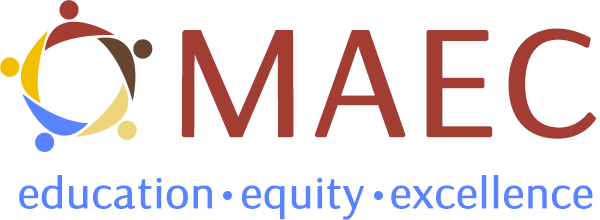Meet MAEC Staff – Kasia Razynska

At MAEC, collaboration and shared learning are key as we work towards education equity. It is our privilege to nurture a team of innovative, dynamic leaders and rising leaders in this field. In this blog series featuring members of MAEC staff, meet Director of Evaluation and Continuous Improvement, Kasia Razynska!
Who is an advocate or activist that you admire, and why?
I admire the organizers and leaders at the Harvard Union of Clerical and Technical Workers (HUCTW), particularly Kris Rondeau and Bill Jaeger. Coming from a labor movement background, I learned the importance of building a strong community and the power of personal relationships and partnerships in producing lasting change from them.
Building on the momentum of the women’s movement of the 1970s, HUCTW organizers successfully managed to build a union that uses community organizing and interest-based bargaining, as opposed to more traditional and often adversarial approaches to achieve social progress. I highly recommend the book We Can’t Eat Prestige by John Hoerr if you’d like to learn more about the creation of HUCTW.
What does education equity mean to you?
We will have achieved educational equity when characteristics such as race, gender, socioeconomic status (SES), and status as an English Learner stop being huge predictors of academic achievement. That will mean every child is able to reach their potential without systemic barriers they currently face.
Tell us about a book in your office you think everyone should read.
I would have to choose Steet Data by Shane Safir and Jamila Dugan. I also highly recommend the accompanying Street Data podcast.
This book explores how school systems leverage big data, dashboards, and testing to drive educational change. It offers solutions that prioritize addressing the specific needs of each student, particularly those who are currently minoritized by the US education system. This topic resonates with me because of my own experiences as a student.
As an immigrant from Poland, I faced numerous cultural and linguistic barriers when I arrived in the United States at the age of 13. Throughout my schooling, I often felt like an outsider. The interventions meant to support me often left me feeling excluded and confused. While my parents did their best to assist me, they too encountered similar barriers. I distinctly remember the frustration and sense of invisibility I felt in eighth grade, questioning whether school was meant for me.
However, my situation took a positive turn when I encountered a skilled teacher who recognized my struggles and took the time to understand my individual needs. Their intervention made a significant difference in my educational journey.
Until it is a part of our practice to treat every child’s experience as valid and important and giving educators the skills necessary to gather information about these experiences, our education system will exclude some children. Schools need better guidance on how to collect data about individual student needs in ways specifically designed to reach each child in an asset based and culturally responsive way. This book helps provide an approach for rethinking how we use data in order reach all children, not just the average or the majority.
Tell us about a book on your bedside table you think everyone should read.
Mia Learns to Soar by MAEC’s Kailanya Brailey. These days, my favorite thing to do at bedtime is read with my daughter who is turning 6 and just started reading independently. It’s cute, relatable, and empowering. I highly recommend this children’s book to everyone, but especially to other parents of five-year-olds. I’m on a personal mission to make it the next children’s classic.
What is one thing that brings you joy?
Right now, it’s a four-way tie between fixing up old, beat-up American Girl dolls, finding creative ways to use Excel to solve my problems, talking people’s ears off about the benefits of forging for mushrooms, and spending uninterrupted quality family time with my husband and two kids.

